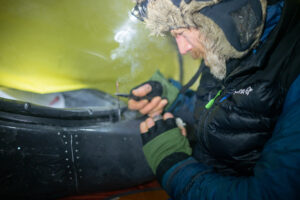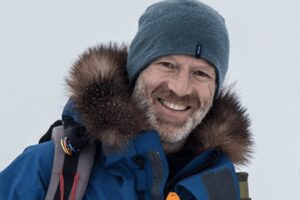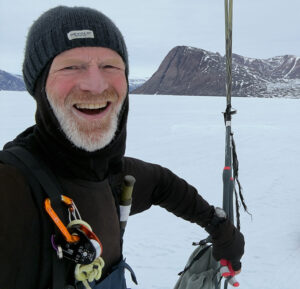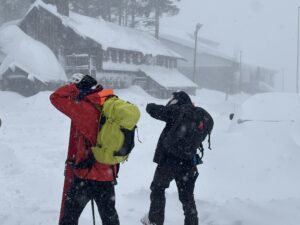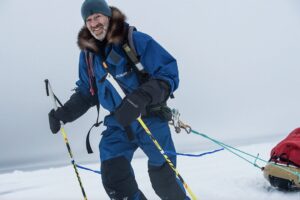In 2016, Marin Minamiya became the youngest Japanese person to climb Everest and complete the Seven Summits, at just 18. She is also the youngest woman to climb Manaslu. Finally, she has skied the last degree to both the North and South Poles, thereby becoming the youngest person to complete the Explorer’s Grand Slam. The whole endeavor took just over two years. Marin is also the first woman to be the Global Brand Ambassador for the clothing giant, Uniqlo.
She now joins the ExWeb team as our newest ambassador.
“Bubbly exterior, steely core” – Newsweek magazine
Marin’s native tongue is Japanese, but she speaks fluent English, basic Mandarin and some French. Her hobbies are, improbably, baking pies and sewing. She expresses herself confidently and is unafraid to think before she answers. At 21, Marin has notched up a list of adventuring achievements that would take most people a lifetime. Yet she does not consider herself an explorer. “It was just a project,” she says. “This is not my identity.”
Marin was one-and-a-half years old when her family moved overseas from Japan. The only child of a financial trader, she lived in Malaysia, Shanghai, Dalian and finally Hong Kong, where she attended an international school for expatriate children. The high-pressure, high-tech school gave her little face-to-face interaction. All the kids had their own computer, and everything was online. Even chats with friends happened on Facetime over lunch.

Photo: Marin Minamiya
Beginnings
Hong Kong may not be known for its outdoorsiness, but Marin first experienced climbing on a school trip to Lantau, Hong Kong’s largest island. Compared to her isolated digital life at school, the excursion involved real human interactions and showed her what the mountains could offer: better relationships and contact with nature.
Marin’s parents divorced when she was 17, an event that made her feel like her life was out of control. “I’ve always felt like a puppet with no control over my life, but after the divorce, I needed to get in touch with my core identity,” she says. While this might have led into teenage delinquency, Marin had other ideas. “I definitely experimented a lot, but the only thing that worked for me was being in nature, with my thoughts.” So she set herself a goal: to climb Everest.
Her adventurous leanings were unusual not just for a young Japanese woman, but for anyone in contemporary Japan. The country has changed from the confident, heady days of the post-war economic boom 30 years ago. Over-protective parenting and the education system have led to the phenomenon of hikikomori – acute shut-ins who shun all social interaction. Older Japanese wring their hands at “herbivore men,” kind and gentle adult males who are hypersensitive, conflict adverse and show little interest in sex. Finally, there is the “Satori Generation,” which no longer seeks fulfillment through the endless cycle of working and buying. The overwhelming cultural trend seems to be one of passive introversion. This makes a dynamic, confident woman like Marin even more of an outlier. It also helped her stand out more than she might have in, for example, the United States.
The Ups and Downs of Sponsorship
Marin was determined to fund her climbs independently of her parents. “I contacted all the newspapers and said, “Hey, I’m going to be the youngest Japanese person to climb Everest. Please write an article about me.” Two of them did, and as a result, she received a donation to climb Aconcagua.
When she returned, she started writing articles about her journeys for niche publications, while promoting herself and seeking sponsors for her bid to climb the Seven Summits.
Despite her age, she didn’t immediately turn to social media. She preferred to meet potential sponsors face to face and form a personal relationship. First, she emailed 100 companies a day, and one of them — Uniqlo, the clothing company that also sponsors tennis stars Roger Federer and Kei Nishikori — saw something they liked in her. She calls it pure luck, but she was the first woman to land such a deal with Uniqlo. In Japan, it’s like getting sponsored by Nike.
So funding for the Seven Summits was taken care of. Afterward, she immediately set her eyes on the next prize: to ski the last degree to the North and South Poles, and so complete the Explorer’s Grand Slam.
Now working with several firms, she employed a manager to oversee her personal brand and help secure funding for the final leg of the Grand Slam – the North Pole. “It became more like a business and less about enjoying the journey, which was the real purpose,” she said. “You have to keep asking ‘What do I want? Why am I going on these climbs? Am I becoming the person I want, or am I moving further away from that?'”
She began these adventures, she said, because she felt that her life was out of control. Now it seemed that she’d come full circle: “My manager controlled my work schedule and I had to be careful in my private life because everything I did reflected on my sponsors.”

Uniqlo ambassadors Marin Minamiya and tennis pro Kei Nishikori. Photo: Marin Minamiya
Close calls
While she was descending Japan’s Mount Amida in 2015, a narrow ledge gave way and she tumbled 250m down a steep slope in a place that had killed someone just the month before. Although she was miraculously unharmed, her prospects for survival were not good: She was unable to climb back up, and her teammates were convinced that she couldn’t still be alive, so they didn’t look for her. She spent a night shivering in a snow cave that she hollowed out, and a rescue helicopter found her as she was making her way down the next day.
This event scared her, but it did not stop her. On the contrary: “It actually pushed me to achieve more. It was my first near-death experience. I realized that I want to live every day in a more fruitful and meaningful manner. That said, I don’t think the 18-year-old me who had that accident would be happy about how I’m living now. I could do better in making each day count.”
Marin also faced tragedy on her expedition to Manaslu. It was her first 8,000’er. By now, she had experience with peaks in the 4,000m to 7,000m range, but Manaslu was a different calibre. Her teammates on the 40-day expedition included many gnarled veterans with Himalayan experience. Some had lost fingers or toes to frostbite. On the descent, Zoltan Benedek, the strongest member of her team, died of altitude sickness. “When he was feeling sick, there was no one to help,” she said. “That taught me to prepare for the worst. I take the risks into consideration, but would I let the fear consume me? No.”

At the summit of Everest. Photo: Marin Minamiya
“You’re just a girl”
Mountaineering is still largely a male domain, and especially challenging for young women. “Many times, I was the only girl in the team. There was sometimes this vibe at the beginning that I was expected to stay in the tent and cook. But I carried heavier stuff and helped other climbers when they were tired, to earn their respect.”
Still, she regularly ran into doubters, especially before she could demonstrate her prowess. A Japanese guy who had already knocked off the Seven Summits told her, “There is no way you can do this; you are just a 17-year-old girl.” That she was trying to climb Everest was an insult to him.

Photo: Marin Minamiya
Future plans
Marin’s studies took a back seat for a few years, as she worked her way through the Grand Slam. Now, she is fully focused on university, where she is majoring in economics and political science. Still, she would prefer to be in business with her friends than to go to school.

Photo: Marin Minamiya
In the meantime, Marin has started sailing and has already completed a voyage from Cape Town to Madagascar and back. Some rumors suggest that she is training for a circumnavigation of the globe. When asked about her future plans, she thinks over her reply and decides to remain tight-lipped.

